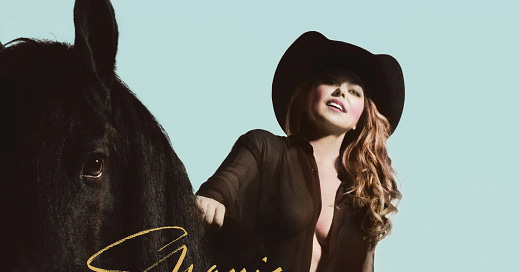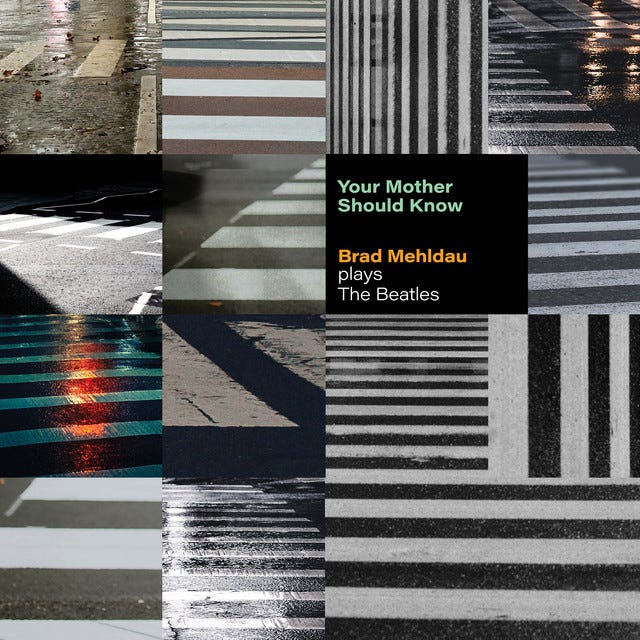Adventures in Listening, February 15, 2023: Shania Shrinks
Plus: Joe Chambers rumbas. Brad Mehldau plays the Beatles. And U2 continues to baffle.
Shania Twain - Queen of Me
By almost any quantifiable metric, Shania Twain was one of the biggest stars of the 1990s— the first female artist to reach diamond sales status, she outsold zeitgeist-defining artists like Nirvana by millions upon millions of records, the breadth of her appeal matched only by Garth Brooks and perhaps a few others. The albums from her imperial era still seem towering to this day, not just for their commercial prowess but also for their massive ambition, the way they’re overstuffed with humor and hooks, puffed up with sheer swagger. But where a record like Come On Over has the bearings of a juggernaut, the new album Queen of Me may be the first-ever Shania Twain release that feels smaller than life.
It’s not just because, at 35 minutes, it’s shorter than her other albums, less than half the length of 2002’s Up. It’s not just because the album has a bright, brittle production that makes it sound disposable. It’s not just because most of the album feels so low-energy. (The dawdling opening number “Giddy Up!” feels taunted by its own punctuation.) It’s not even because, where she once blazed a trail, Twain now sounds like she’s straining to catch up, lagging in the shadow of the artists she inspired. (To be fair, the overtly Swiftian melody in “Waking Up Dreaming” is one of the few really effective moments on the whole album. Let’s get a [Taylor’s Version] of that!)
What truly makes the album feel small is that Twain has chosen to chronicle a tumultuous season in her life strictly through the mode of empowerment anthems— songs of forced positivity and vaguely feminist uplift. This is regrettable, not least because Twain has been through some heavy things that deserve a more nuanced and vulnerable reckoning: In the years since Up, she divorced her long-time husband and producer after finding that he’d been unfaithful, she waged a battle with Lyme disease that almost cost her her voice, and she survived a near-fatal COVID infection. Of course, there’s no law saying Twain has to write about her private life at all, and she often chose to avoid these subjects on her previous album Now. The problem here is that it does seems like she’s trying to write her way out of a tragic narrative, aiming to convey fierceness and autonomy but instead making the whole affair seem trivial.
Consider the opening lines to “Queen of Me,” ostensibly a post-divorce song, but here pitched as boilerplate self-affirmation: “I’m not a girl, I’m not a boy/ I’m not a baby, I’m not a toy/ I’m a queen.” There’s also the chorus of “Pretty Liar,” literally a playground taunt, evidently the best dressing-down of an unfaithful partner that she can muster: “Oh your pants are on fire/ You’re such a fucking liar.” These songs fall flat partly because they are nonspecific and insubstantial, but the biggest issue is that they are simply unpersuasive. Twain’s gestures toward optimism and resilience are too flimsy to be believed, particularly when paired with music so absent any creative vigor, unique point of view, or even gallows humor. The effect of her hollow platitudes and putdowns isn’t to magnify her strength so much as to make her problems seem slight— but making light of suffering is hardly the same thing as redeeming it.
Joe Chambers - Dance Kobina
From the 1960s onward, drummer and vibraphonist Joe Chambers played on a string of essential albums for the Blue Note label, including albums by Wayne Shorter, Andrew Hill, and Freddie Hubbard. Now 80 years old, Chambers is back at Blue Note making some of the most exquisitely-realized music of his career, this time under his own name. Dance Kobina is a spellbinding collection, drawing from trio sessions as well as larger ensembles, all of the songs loosely inspired by guaguancó, a type of Cuban rumba. But you don’t have to know anything about the intersection of Latin and African music, nor even about jazz itself, to be drawn in by this hypnotically beautiful, rhythmically vibrant record. Chambers’ interest isn’t in rote recreation but rather in using established forms as a vehicle for exploration, and the music here encompasses a dazzling array of textures and moods. Sensualists will revel in the tactile pleasures— fingers running up and down an upright bass, cymbals reverberating in the air, all of it captured in pristine sonic clarity. And that’s to say nothing of the tunes— romantic, passionate, accessible to anyone. Dance Kobina combines a discoverer’s zeal with a master craftsman’s confidence, and I’d bank on it enduring as one of the most enthralling jazz albums of the year.
Brad Mehldau - Your Mother Should Know: Brad Mehldau Plays The Beatles
I sometimes struggle to fully engage with solo piano records— so much of what I love about jazz is the act of co-creation involving different players. On his latest album, the prolific Brad Mehldau sidesteps this concern by co-creating with The Beatles themselves. Mehldau has long found musical and intellectual stimulation in the classic rock songbook, performing memorable interpretations of Paul Simon, Radiohead, and Rush, but Your Mother Should Know stands out as a particularly delightful, inventive release. Part of it’s because he does such an impressive job capturing the breadth and depth of The Beatles’ music: “Your Mother Should Know” leans into music hall whimsy— the type of smiling vaudeville John Lennon derided as “granny music”— but segues immediately into a pounding, barrelhouse version of “I Saw Her Standing Here,” a surprisingly effective invocation of Beatlemania’s rock-and-roll energy. Mehldau also shows a real affinity for what makes these songs tick, staying true to their essence even when slightly reworking them: A spare version of “She Said, She Said” hauls Lennon’s underlying menace straight to the surface, while a relaxed performance of “Maxwell’s Silver Hammer” deepens its winking humor. This varied program includes several moments of sheer beauty— Revolver tracks “For No One” and “Here, There and Everywhere” both sound here like lost Bill Evans tunes— but to be fair, Mehldau has the deck stacked in his favor: Just about every song serves as a reminder that he’s drawing from arguably the most enchanting set of melodies ever written.
U2 - “One” [Songs of Surrender Version]
I increasingly think the whole Songs of Surrender endeavor is the most creatively baffling decision of U2’s entire career— and this is the band that entered its PopMart concerts by way of motorized lemon, invested an inordinate amount of time into a doomed Spider-man musical, and recorded an absolute turd of a song for the Sing 2 soundtrack. I’m happy to surrender (!) my belief that there’s necessarily a “definitive” version of any song, but not my belief that some versions are better than others. Here, as with previous singles from this album, U2 abandon almost everything that made the original song effective— the simmering groove, the richly textured production, the whiskey-sour intonation in Bono’s voice, even the urgency in the melody. The words are still great, but, it turns out, not enough. (And Bono’s one literary revision isn’t an improvement.) This feels like it could have been an acoustic “bonus” track from the CD boom, and I probably would have listened a time or two just to make sure I got my money’s worth.
Burt Bacharach & Elvis Costello - Painted from Memory
The White Stripes - “I Just Don’t Know What to Do with Myself”
Rest in peace Burt Bacharach. Like many listeners of a certain age, I came to him by way of Elvis Costello. Their collaborative album Painted from Memory is a classic, a portrait of both artists as consummate craftsmen. Perhaps that word connotes a kind of bland professionalism, but it shouldn’t: Foremost among Bacharach’s gifts were the ways he employed precision, economy, and meticulous pacing to drive maximum emotional impact. His best songs are empathy generators, and listening to Painted from Memory still makes me feel things. Can’t wait for the upcoming box set!
I’ve also been thinking about the Bacharach cover from Elephant, where his scrupulous structure and architectural excellence don’t so much contain Jack White’s raw, emotive energy as focus and direct it. Bacharach’s writing provides invisible scaffolding for Jack’s supersized catharses.







